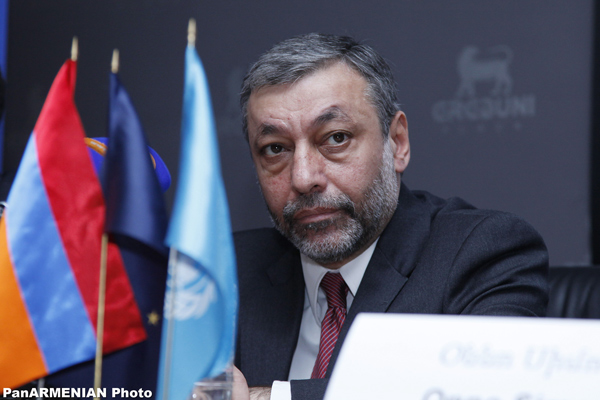Six years later, a new region, new opportunities
In 2008, under the initiative of the President of Armenia, Serzh Sargsyan, a new phase of the Armenian-Turkish normalization process began. On June 25, meeting with representatives of the Armenian community in Russia, Serzh Sargsyan announced about initiating new steps towards promoting the Armenian-Turkish relations, he said that he intends to invite Turkish President Abdullah Gül to Yerevan and together watch the football match of Armenia-Turkey football national teams. A process commenced, which obtained the name of “Football Diplomacy”. Exactly one month later, on July 24, Serzh Sargsyan sent an official invitation to the President of Turkey, and on September 6, the day of Armenia-Turkey football match, President Gül was in Yerevan. Since then, the Armenian-Turkish relations normalization process became a key topic of discussion both locally and internationally. On October 10, 2009, in Zurich, the Foreign Ministers of the Republic of Armenia and Turkey signed Protocols on “Establishment of diplomatic relations between the Republic of Armenia and Republic of Turkey” and on “Development of relations between Armenia and Turkey”.
After signing the Protocols, dramatically changing its position and refusing the agreements reached to normalize bipartite relations within the “reasonable dates” and without preconditions, the Turkish Grand National Assembly conditioned ratification of the Protocols by the normalization of the Nagorno-Karabakh conflict. Six years after this failed process enriched by just one pack of documents on normalization of the Armenian-Turkish relations, the Turkish government is again in an active domestic political situation, this time in the process of normalization of relations with its own citizens, while Armenia is facing the new geopolitical realities and opportunities. The former Foreign Minister, also the member of the NA Foreign Relations, Alexander Arzumanyan, believes that the Armenian-Turkish relations normalization process will be resumed sooner or later, but not now.
– Turkey currently has so many problems. I do not think that any politician in Turkey at this time thinks about it. On the contrary, in this pre-election phase, Turkey’s ruling party will display a tougher stance on the Armenian issue in general. Do you remember how many offensive things Erdoğan said about Armenians? So it will go. Hence, at this point, I do not see anything. Once the new government is formed, a majority government, then it will possible to discuss. But at this point, it is a standstill situation.
Read also
– Six years later, when the protocols and the process of normalization of relations were in the active phase, many opposition figures were saying that by signing the protocols, Armenia hits its international rating and reputation. If we try to analyze from a distance of six years, after all, did these protocols and the process give us anything or not?
– I have also expressed negatively towards the original text of the protocols because there were problems. But the process itself was a right process. And, eventually, the entire international community realized that the protocols were not ratified because Turkey violated the previously reached agreements that the process should be lead without preconditions. The fact that Turkey torpedoed the process, it became evident, and it is no coincidence that the foreign ministers of the OSCE Minsk Group co-chair countries had said that the ball is no longer in Turkey’s playground. In this regard, Armenia managed to maintain its image to the end. Since 1991, our policy has been one – to establish normal and good neighborly relations without preconditions. I do not think that Armenia suffered heavy losses in terms of its image.
– What should be done with these protocols: to keep or to send them to hell, as once Serzh Sargsyan said?
– I cannot say, there are different approaches. But currently, there is no process, and I think it is not right to focus the attention on a process that does not exist. They are thrown to somewhere, let them stay there. Let Turkey solve its internal problems, the remaining will be showed in the process. Currently, there are other developments in the region. The region of six years ago and now are very different realities, completely different geopolitical situations. I do not know to what extent it is appropriate to continue this subject now.
– When the process resumes, should it be continued from the point of the protocols where is was stopped or Armenia needs to have a tougher stance?
– Tough or soft, I do not know. It is a diplomacy, diplomatic flexibility, which is manifested by a number of geopolitical realities. Armenia should be guided by the practice of servicing the interests of Armenia the best. Time will show what will be the moment to dictate.
– In terms of geopolitical and regional, quite interesting situation is created, which is also rich with opportunities for Armenia. Armenia’s diplomatic corps, despite this, is rather passive, particularly, let’s say, in its initiatives and statements related to Iran. Can we use the provided opportunities or once again, we are not ready?
– The question should be put this way: we ought to use these opportunities. Whether we are able to derive the maximum benefit from it or not, it is another question. If the question is that our diplomatic department is not active, it is a subject for a separate discussion. But the point that many and varied opportunities are opened, it is a fact and we need to derive the maximum benefits from them a day before.
Nelly GRIGORYAN,
“Aravot” daily























































